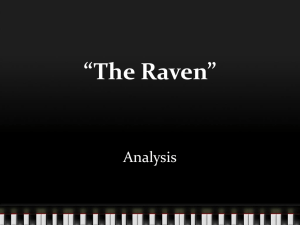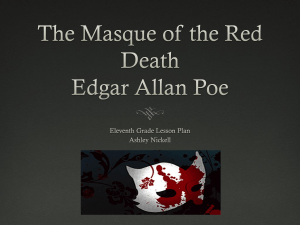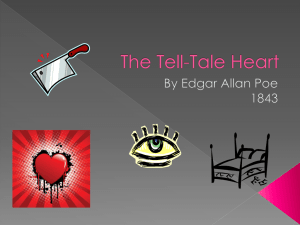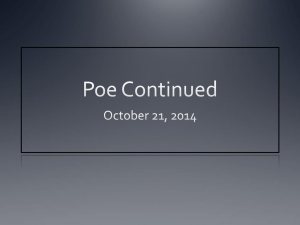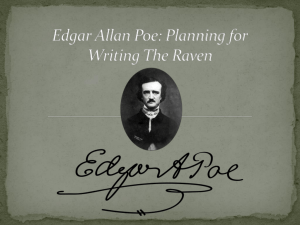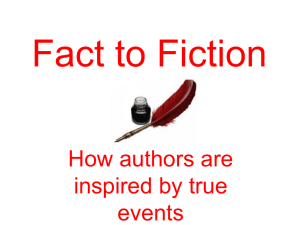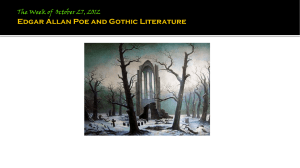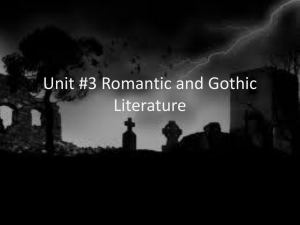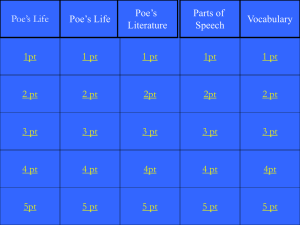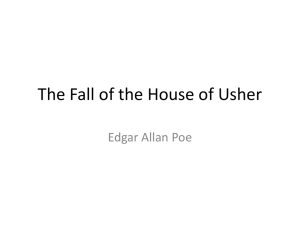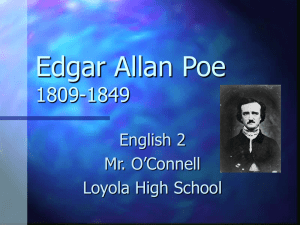Edgar Allan Poe (1809
advertisement
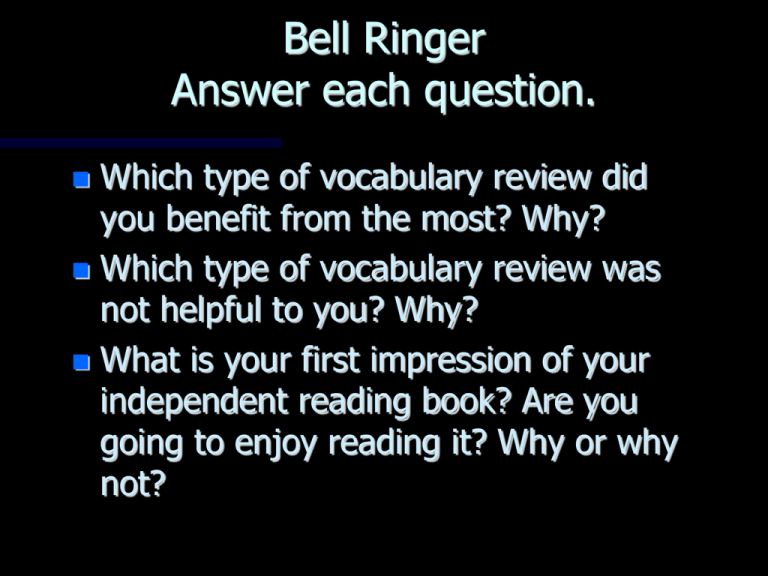
Bell Ringer Answer each question. Which type of vocabulary review did you benefit from the most? Why? Which type of vocabulary review was not helpful to you? Why? What is your first impression of your independent reading book? Are you going to enjoy reading it? Why or why not? Edgar Allan Poe Early Life Poe was born in Boston on January 19, 1809, his parents’ second child. In December 1811, his mother died at twenty-four, and her husband disappeared completely. Poe was taken in by John Allan, a successful and stable Richmond merchant. College Poe spent most of 1826 at the University of West Virginia, doing well in his studies, but running up gambling debts and drinking. Poe returned to Richmond to find his sweetheart, (Sarah) Elmira Royster, engaged. He was admitted at West Point in 1830, but got himself expelled by missing classes and roll calls. By 1831, Poe had already published three versions of his early poetry. He married his young cousin Virginia Clemm, who was only thirteen. During the last two years of his life, Poe was seriously ill--perhaps with a brain lesion--and drinking steadily. On Election Day, October 3, 1849, he was found senseless near a polling place. Poe was taken to a hospital and died on October 7, “of congestion of the brain.” Characteristics of the Gothic Genre Poetry, short stories, or novels designed to thrill readers by providing mystery and blood-curdling accounts of villainy, murder, and the supernatural. include wild and desolate landscapes, ancient buildings such as ruined monasteries; cathedrals; castles with dungeons, torture chambers, secret doors, and winding stairways; apparitions, phantoms, demons, an atmosphere of brooding gloom; handsome heroes and heroines who face off against corrupt aristocrats, wicked witches, and hideous monsters. The term Gothic comes from the idea that most of the stories take place in Gothic (Medieval, Germanic) style buildings Other elements of the Gothic Hidden Evil – Unspeakable, mysterious crimes, including incest and paracide Obsession with Death – Ghosts, blood, body parts Maniacal Laughter The Discovered Manuscript – gives responsibility to someone else Deformity – the grotesque--people who don’t look right are capable of activity beyond the norm “The Raven” pg. 330 Alliteration Inference Allusions Onomatopoeia Symbol Rhyme Scheme Important Allusions Pallas Plutonian Nepenthe Balm in Gilead Aidenn Pallas Pallas Athena is the ancient Greek goddess of wisdom. Plutonian This is an allusion to the Roman god of the underworld (Pluto). The adjective "Plutonian" is meant to make us think of all the scary things that one associates with the underworld: darkness, death, the afterlife etc. Nepenthe This is an allusion to a mythological drug that you might take to forget your grief. In the Odyssey, Homer describes nepenthe in exactly this way, as a drink that will take away all sadness. Balm in Gilead This is a Biblical allusion to a region in ancient Palestine that made a healing ointment. The balm = the ointment Gilead = the place Aidenn Means Eden or heaven in Arabic. Describe the feelings that come to mind after reading these words: Sorrow Darkness Dreary Bleak Grave Stern Stilln ess Ghost Lost Melancholy Make some guesses about the setting and atmosphere of the poem: • What time of day is it? • What time of year? • How is the author feeling? • Is he alone or with other people? In what ways does Poe’s use of sound devices contribute to the creation of a single effect? Poe’s use of alliteration, internal rhyme, repetition, and onomatopoeia gives a musical quality to his work. Poe’s use of these devices creates a hypnotic effect that draws the readers into the speaker’s world. Internal Rhyme An internal rhyme is a rhyme or multiple rhymes which occur within a line, rather than in the typical end-word rhyme structure. “Eagerly I wished the morrow; -- vainly I had sought to borrow.” (line 9) Analysis Line: Device: Effect: Works Cited cag11english.pbworks.com/f/poe_ppt. ppt
